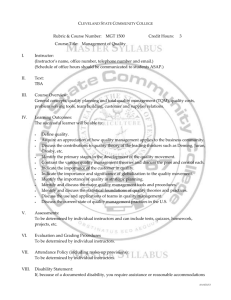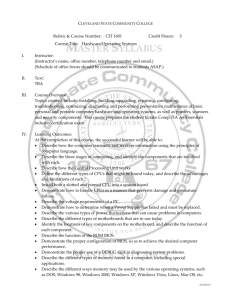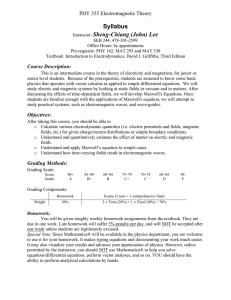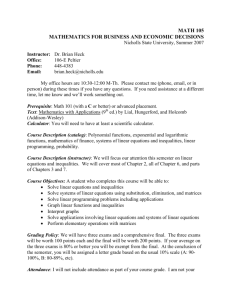Syllabus Sheng-Chiang (John) Lee PHY 385 Computational Physics
advertisement
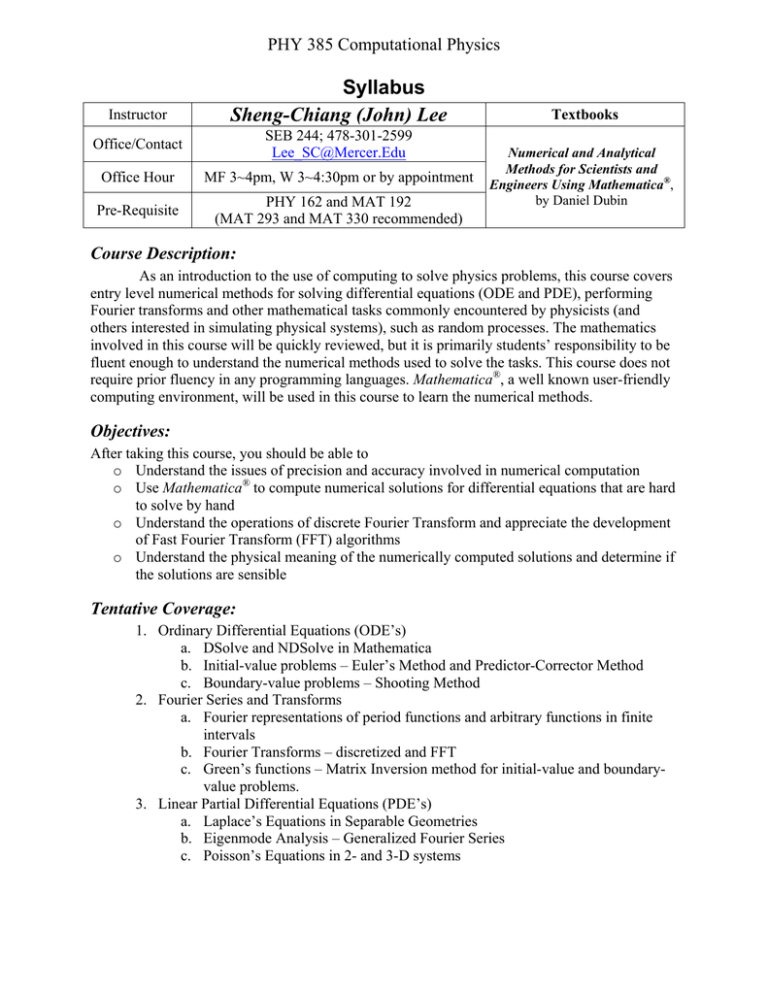
PHY 385 Computational Physics Instructor Syllabus Sheng-Chiang (John) Lee Office/Contact SEB 244; 478-301-2599 Lee_SC@Mercer.Edu Office Hour MF 3~4pm, W 3~4:30pm or by appointment Pre-Requisite PHY 162 and MAT 192 (MAT 293 and MAT 330 recommended) Textbooks Numerical and Analytical Methods for Scientists and Engineers Using Mathematica®, by Daniel Dubin Course Description: As an introduction to the use of computing to solve physics problems, this course covers entry level numerical methods for solving differential equations (ODE and PDE), performing Fourier transforms and other mathematical tasks commonly encountered by physicists (and others interested in simulating physical systems), such as random processes. The mathematics involved in this course will be quickly reviewed, but it is primarily students’ responsibility to be fluent enough to understand the numerical methods used to solve the tasks. This course does not require prior fluency in any programming languages. Mathematica®, a well known user-friendly computing environment, will be used in this course to learn the numerical methods. Objectives: After taking this course, you should be able to o Understand the issues of precision and accuracy involved in numerical computation o Use Mathematica® to compute numerical solutions for differential equations that are hard to solve by hand o Understand the operations of discrete Fourier Transform and appreciate the development of Fast Fourier Transform (FFT) algorithms o Understand the physical meaning of the numerically computed solutions and determine if the solutions are sensible Tentative Coverage: 1. Ordinary Differential Equations (ODE’s) a. DSolve and NDSolve in Mathematica b. Initial-value problems – Euler’s Method and Predictor-Corrector Method c. Boundary-value problems – Shooting Method 2. Fourier Series and Transforms a. Fourier representations of period functions and arbitrary functions in finite intervals b. Fourier Transforms – discretized and FFT c. Green’s functions – Matrix Inversion method for initial-value and boundaryvalue problems. 3. Linear Partial Differential Equations (PDE’s) a. Laplace’s Equations in Separable Geometries b. Eigenmode Analysis – Generalized Fourier Series c. Poisson’s Equations in 2- and 3-D systems PHY 385 Computational Physics d. Numerical Methods i. Fourier Transform ii. WKB iii. Galerkin iv. Grid 4. Random Process (optional) Grading Methods: Grading Scale: Score: Grade: 90+ A 85~89 B+ 80~84 B 75~79 C+ 70~74 C 60~69 D 59F Grading Components: Weight Quiz Homework/Lab Final Project 10% 40% 50% Quiz: Students should always be prepared for a class. Reading quizzes will be delivered throughout the semester and will always be announced in the previous class. Homework/Lab: Homework assignments are exercise problems selected from the textbook. They are not expected to be completed within the laboratory periods. The laboratory periods will be used to provide introduction and assistance to the assignments. Final Project: Students should choose a physical system to solve/model/simulate in Mathematica® with the tools learned in this course. The topic of this final project should be submitted to the instructor for approval and discussion before the end of the week after Fall break, and be determined no later than the end of October. Class Evaluation In an ongoing effort to improve the quality of instruction, each student enrolled in this course is required to complete an end-of-semester course evaluation, to be administered through BlackBoard during the last week of the semester. Students failing to submit the evaluation by 12/10 will be assigned the grade of “Incomplete,” which will automatically turn into an “F” if the evaluation is not submitted by the midterm of the very next semester. Important Dates: Last Day for Course Withdrawal: 10/29!!!! Final Project Due: 12/14, 5pm PHY 385 Computational Physics Class Policies: Attendance Policy: Attendance is not mandatory. However, students with more than an occasional absence usually perform poorly in the class. Class Etiquette: You are expected to conduct yourself in a respectful manner to your fellow classmates and the instructor. The instructor may ask you to leave the classroom/lab if your behavior is disturbing to the instructor or other students. Honor Code: You are bound by the Mercer honor code. The College’s academic misconduct policy will be followed. All work, for which a grade is received, must be the original work of the student without aid or assistance of another party, or any printed and or electronic data/information. Academic misconduct cases will be referred to the honor council and the student will automatically receive a grade of incomplete (IC) pending a ruling by the honor council. Cell Phone and Pager Usage: Out of courtesy for all those participating in the learning experience, all cell phones and pagers must be kept in your pocket/backpack with power/ringer off before entering any classroom, lab, or formal academic or performance event. Warning will be given for the first-time violation. One semester credit will be taken for each following violation up to three times. If a student keeps violating the policy, one may be asked to leave the room by the instructor. Documented Disability Statement: Students requiring accommodations for a disability should inform the instructor at the close of the first class meeting or as soon as possible. The instructor will refer you to the Disability Support Services Coordinator to document your disability, determine eligibility for accommodations under the ADAAA/Section 504 and to request a Faculty Accommodation Form. Disability accommodations or status will not be indicated on academic transcripts. In order to receive accommodations in a class, students with sensory, learning, psychological, physical or medical disabilities must provide their instructor with a Faculty Accommodation Form to sign. Students must return the signed form to the Disability Services Coordinator. A new form must be requested each semester. Students with a history of a disability, perceived as having a disability or with a current disability who do not wish to use academic accommodations are also strongly encouraged to register with the Disability Services Coordinator and request a Faculty Accommodation Form each semester. For further information, please contact Carole Burrowbridge, Disability Services Coordinator, at 301-2778 or visit the Disability Support Services website athttp://www.mercer.edu/studentaffairs/disabilityservices.
